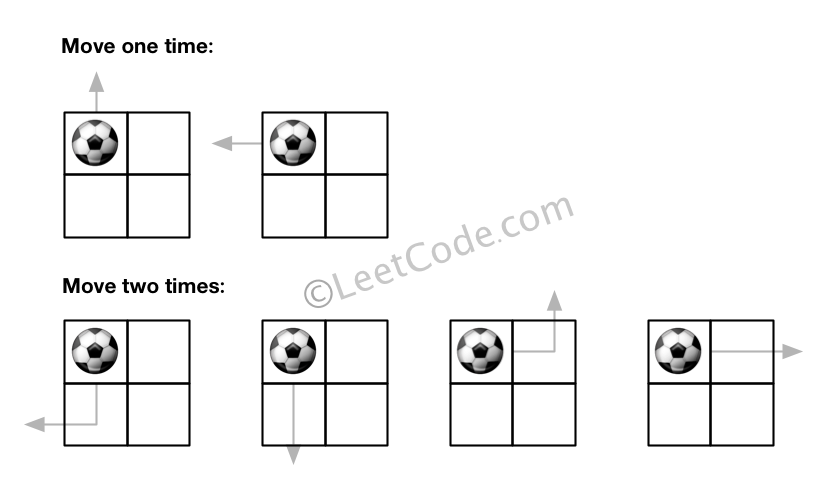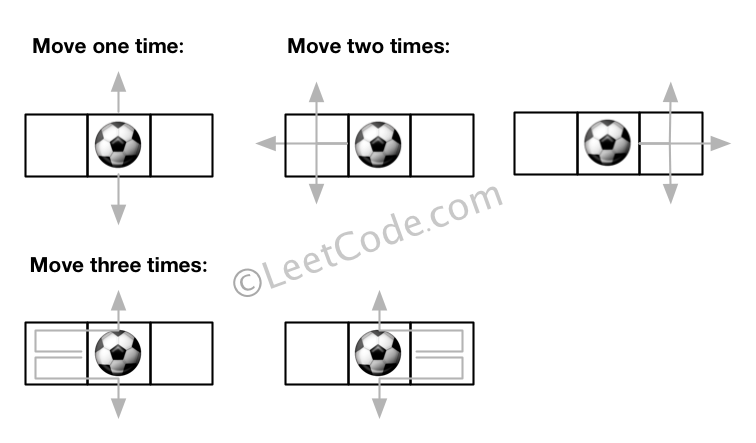Welcome to Subscribe On Youtube
576. Out of Boundary Paths
Description
There is an m x n grid with a ball. The ball is initially at the position [startRow, startColumn]. You are allowed to move the ball to one of the four adjacent cells in the grid (possibly out of the grid crossing the grid boundary). You can apply at most maxMove moves to the ball.
Given the five integers m, n, maxMove, startRow, startColumn, return the number of paths to move the ball out of the grid boundary. Since the answer can be very large, return it modulo 109 + 7.
Example 1:

Input: m = 2, n = 2, maxMove = 2, startRow = 0, startColumn = 0 Output: 6
Example 2:

Input: m = 1, n = 3, maxMove = 3, startRow = 0, startColumn = 1 Output: 12
Constraints:
1 <= m, n <= 500 <= maxMove <= 500 <= startRow < m0 <= startColumn < n
Solutions
-
class Solution { private int m; private int n; private int[][][] f; private static final int[] DIRS = {-1, 0, 1, 0, -1}; private static final int MOD = (int) 1e9 + 7; public int findPaths(int m, int n, int maxMove, int startRow, int startColumn) { this.m = m; this.n = n; f = new int[m + 1][n + 1][maxMove + 1]; for (var a : f) { for (var b : a) { Arrays.fill(b, -1); } } return dfs(startRow, startColumn, maxMove); } private int dfs(int i, int j, int k) { if (i < 0 || i >= m || j < 0 || j >= n) { return 1; } if (f[i][j][k] != -1) { return f[i][j][k]; } if (k == 0) { return 0; } int res = 0; for (int t = 0; t < 4; ++t) { int x = i + DIRS[t]; int y = j + DIRS[t + 1]; res += dfs(x, y, k - 1); res %= MOD; } f[i][j][k] = res; return res; } } -
class Solution { public: int m; int n; const int mod = 1e9 + 7; int f[51][51][51]; int dirs[5] = {-1, 0, 1, 0, -1}; int findPaths(int m, int n, int maxMove, int startRow, int startColumn) { memset(f, 0xff, sizeof(f)); this->m = m; this->n = n; return dfs(startRow, startColumn, maxMove); } int dfs(int i, int j, int k) { if (i < 0 || i >= m || j < 0 || j >= n) return 1; if (f[i][j][k] != -1) return f[i][j][k]; if (k == 0) return 0; int res = 0; for (int t = 0; t < 4; ++t) { int x = i + dirs[t], y = j + dirs[t + 1]; res += dfs(x, y, k - 1); res %= mod; } f[i][j][k] = res; return res; } }; -
class Solution: def findPaths( self, m: int, n: int, maxMove: int, startRow: int, startColumn: int ) -> int: @cache def dfs(i, j, k): if i < 0 or j < 0 or i >= m or j >= n: return 1 if k <= 0: return 0 res = 0 for a, b in [[-1, 0], [1, 0], [0, 1], [0, -1]]: x, y = i + a, j + b res += dfs(x, y, k - 1) res %= mod return res mod = 10**9 + 7 return dfs(startRow, startColumn, maxMove) -
func findPaths(m int, n int, maxMove int, startRow int, startColumn int) int { f := make([][][]int, m+1) for i := range f { f[i] = make([][]int, n+1) for j := range f[i] { f[i][j] = make([]int, maxMove+1) for k := range f[i][j] { f[i][j][k] = -1 } } } var mod int = 1e9 + 7 dirs := []int{-1, 0, 1, 0, -1} var dfs func(i, j, k int) int dfs = func(i, j, k int) int { if i < 0 || i >= m || j < 0 || j >= n { return 1 } if f[i][j][k] != -1 { return f[i][j][k] } if k == 0 { return 0 } res := 0 for t := 0; t < 4; t++ { x, y := i+dirs[t], j+dirs[t+1] res += dfs(x, y, k-1) res %= mod } f[i][j][k] = res return res } return dfs(startRow, startColumn, maxMove) }